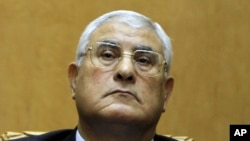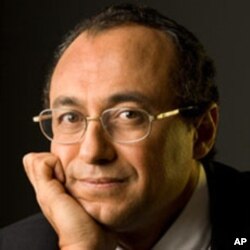WASHINGTON —
Until this week, the name Adly Mansour was virtually unknown in Egypt.
Thursday, the Egyptian military swore him in as Egypt's temporary president, just two days after he was appointed to head his country’s Supreme Constitutional Court. Who, exactly is President Mansour— and why was he chosen to lead his country through this important political transition?
Mansour’s biography is skeletal: He was born in Cairo, studied law at Cairo University, graduating in 1967. He took a scholarship to study management and public affairs at the prestigious Ecole Nationale de l'Administration in Paris, graduating in 1977. Afterward, he returned to Cairo where began his rise in Egypt's judicial system. Former president Hosni Mubarak appointed Mansour vice president of the court in 1992, which makes Mansour one of its longest-serving judges.
Ousted president Mohamed Morsi appointed him to the top judicial post after the former chief's term expired. Mansour helped draft the elections laws that set the timeframe for campaigning in the 2012 vote that brought Morsi to power, the state-run Al-Ahram newspaper reports. He served as deputy head of the Supreme Constitutional Court from 1992.
In a statement to the Al-Shabab newspaper, an offshoot of Egypt’s state-run Al-Ahram newspaper, former head of the State Council head Mohammed Hamed El Gamal describes Mansour as a quiet, calm and balanced, a fair man loyal to “the constitution and the law.”
Tawfik Hamid, Senior Fellow and Chair for the Study of Islamic Radicalism at the Potomac Institute for Policy Studies in Washington D.C., believes the choice of Mansour is highly symbolic.
“It’s not the guy himself or his character that is so important,” Hamid said. “The military literally wanted to say to the world, ‘We didn’t do this to control all power in Egypt. We are choosing a civilian, by the will of the people.’ He is a symbol of civil leadership.”
That said, Hamid does not think Mansour has the expertise or will have the power, say, to choose who will serve as Prime Minister. That will be left to the political parties.
In a statement announcing Mansour’s new position Wednesday, Army chief General Abdel Fattah al-Sisi said Egypt’s constitution had been suspended and announced that Mansour, not the military, will have the power to make constitutional declarations until a new constitution is written and new elections can be held. He will also have some control over drafting of new election laws.
“The military obviously learned from its previous experience,” Hamid said. “So now they are saying clearly they have nothing to do with constitutional declarations. Civilians are the ones who are in full charge of the country.”
This is a milestone for Egypt, says Hamid. But he believes Egyptians have managed to accomplish something even more important this week.
“This is the first time people are daring to say ‘no’ to political or radical Islam,” Hamid said. “The world ‘Islam’ always used to paralyze their minds. There was a psychological barrier that made it impossible for Egyptians to take a stand against it."
With the overthrow of the Muslim Brotherhood government, Hamid says that psychological barrier has been broken.
Thursday, the Egyptian military swore him in as Egypt's temporary president, just two days after he was appointed to head his country’s Supreme Constitutional Court. Who, exactly is President Mansour— and why was he chosen to lead his country through this important political transition?
Mansour’s biography is skeletal: He was born in Cairo, studied law at Cairo University, graduating in 1967. He took a scholarship to study management and public affairs at the prestigious Ecole Nationale de l'Administration in Paris, graduating in 1977. Afterward, he returned to Cairo where began his rise in Egypt's judicial system. Former president Hosni Mubarak appointed Mansour vice president of the court in 1992, which makes Mansour one of its longest-serving judges.
Ousted president Mohamed Morsi appointed him to the top judicial post after the former chief's term expired. Mansour helped draft the elections laws that set the timeframe for campaigning in the 2012 vote that brought Morsi to power, the state-run Al-Ahram newspaper reports. He served as deputy head of the Supreme Constitutional Court from 1992.
In a statement to the Al-Shabab newspaper, an offshoot of Egypt’s state-run Al-Ahram newspaper, former head of the State Council head Mohammed Hamed El Gamal describes Mansour as a quiet, calm and balanced, a fair man loyal to “the constitution and the law.”
Tawfik Hamid, Senior Fellow and Chair for the Study of Islamic Radicalism at the Potomac Institute for Policy Studies in Washington D.C., believes the choice of Mansour is highly symbolic.
“It’s not the guy himself or his character that is so important,” Hamid said. “The military literally wanted to say to the world, ‘We didn’t do this to control all power in Egypt. We are choosing a civilian, by the will of the people.’ He is a symbol of civil leadership.”
That said, Hamid does not think Mansour has the expertise or will have the power, say, to choose who will serve as Prime Minister. That will be left to the political parties.
In a statement announcing Mansour’s new position Wednesday, Army chief General Abdel Fattah al-Sisi said Egypt’s constitution had been suspended and announced that Mansour, not the military, will have the power to make constitutional declarations until a new constitution is written and new elections can be held. He will also have some control over drafting of new election laws.
“The military obviously learned from its previous experience,” Hamid said. “So now they are saying clearly they have nothing to do with constitutional declarations. Civilians are the ones who are in full charge of the country.”
This is a milestone for Egypt, says Hamid. But he believes Egyptians have managed to accomplish something even more important this week.
“This is the first time people are daring to say ‘no’ to political or radical Islam,” Hamid said. “The world ‘Islam’ always used to paralyze their minds. There was a psychological barrier that made it impossible for Egyptians to take a stand against it."
With the overthrow of the Muslim Brotherhood government, Hamid says that psychological barrier has been broken.





